The Last of England Blu-ray Movie
HomeThe Last of England Blu-ray Movie 
Kino Lorber | 1988 | 87 min | Not rated | Jul 24, 2012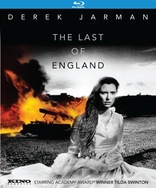
Movie rating
6.6 | / 10 |
Blu-ray rating
| Users | 0.0 | |
| Reviewer | 3.0 | |
| Overall | 3.0 |
Overview
The Last of England (1988)
A kaleidoscopic view of the culture and history of director Derek Jarman's native England. Filled with rage at Margaret Thatcher's conservative reign and haunted by the continuing scourge of AIDS (with which Jarman was diagnosed), the film is both deeply personal and grimly historical, and is undoubtedly one of the most important British films of all time.
Starring: Tilda Swinton, Spencer Leigh, Gerrard McArthur, Jonny PhillipsNarrator: Nigel Terry
Director: Derek Jarman
| Drama | 100% |
Specifications
Video
Video codec: MPEG-4 AVC
Video resolution: 1080p
Aspect ratio: 1.60:1
Audio
English: DTS-HD Master Audio 2.0
Subtitles
None
Discs
25GB Blu-ray Disc
Single disc (1 BD)
Playback
Region free
Review
Rating summary
| Movie | 3.5 | |
| Video | 4.0 | |
| Audio | 3.5 | |
| Extras | 0.0 | |
| Overall | 3.0 |
The Last of England Blu-ray Movie Review
A barbaric yawp for the England of the '80s.
Reviewed by Casey Broadwater July 24, 2012After The Last of England played the New York Film Festival in 1988, a Times critic called it "the longest and
gloomiest rock video ever made." That really is an unbeatable description. Director, prolific diarist, gay rights activist, and
noted gardener Derek Jarman's film is a barbaric yawp, a choppy, non-narrative William Burroughs-style cut-up shot on
Super-8 and edited with prodigious energy. It's at once a eulogy for a British culture long dead, a condemnation of post-WWII
patriotism, a steel-toed boot to the stomach of Thatcher-era economics, and a nightmare vision of a totalitarian future. It's
deeply personal and—at first glance—borderline incomprehensible, an assault of sped-up images overlaid with disconcerting
sound, like some hypothetically apocalyptic Keystone Cops chase sequence fed through a video feedback loop and
scored with blasts from an assault rifle.
It's most definitely not what you might call easy viewing, trading the comparatively conventional structures of
Jarman's best known feature films—the homoerotic hagiography Sebastiane, the punk rock cult classic
Jubilee, the Caravaggio biopic—for the helter-skelter metaphorical quality of his earlier Super-8 shorts. And
honestly, The Last of England would probably work better, if not as a short, then at least in slightly shorter form. It
could most likely be whittled down to an even hour and still have the same impact.
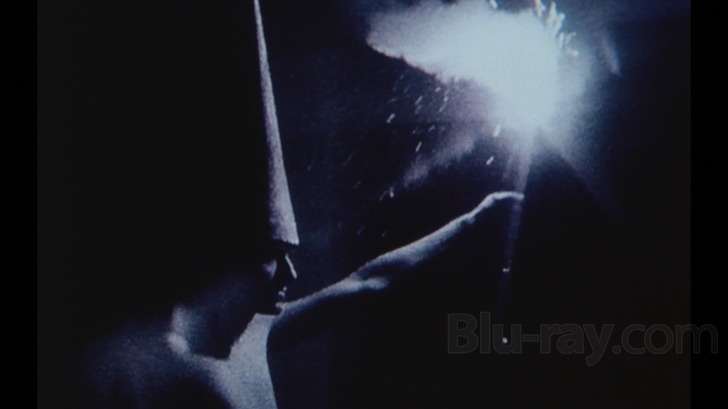
The film takes its title from the Pre-Raphaelite artist Ford Maddox Brown's 1855 painting of the same name, which depicts a family stoically leaving Dover by ship for the New World. In one sense, this exodus of emigrants was the first great sign of the British Empire's decline, a subject in which the film practically wallows. Jarman echoes the title of the painting again in a bit of self-penned verse delivered in the opening sequence by the film's narrator, Nigel Terry (Excalibur): "Spring lapped the fields in arsenic green. The oaks died this year. On every green hill mourners stand and weep for the Last of England." For all intents and purposes, the film itself is a kind of cinematic poetry, snatches of thought arranged visually and symbolically in objective correlatives of emotion. Some of it is gut-punch intuitive, while the obscurity and seeming randomness of other sections demands careful critical exegesis.
Its closest analogue is "The Waste Land," with Jarman borrowing T.S. Eliot's structural bricolage, his use of high-brow and low-brow allusions, and—more than anything—his sense of disillusionment with decaying modern society. There's some James Joyce here too, in the staccato rhythms of the narration—e.g., "Dead souls rat-a-pat-a-patter into the silence...the air stutters tic-tic-tic-tic, rattle of death-watch beetle on sad slate roofs"—and an allegiance with William Burroughs' obsession with cut-and-paste collage. "I saw the best minds minds of my generation destroyed by madness," Jarman quotes from Allen Ginsberg, and the "madness" here seems to be many things—poverty and the threat of nuclear annihilation, heroin abuse and HIV. Jarman himself was diagnosed with AIDS in 1986, during the making of the film, and he eventually died from disease-related complications in 1994.
With no real narrative, The Last of England is organized in a series of what are essentially performance-art set-pieces. The introductory scene cuts rapidly between shots of Jarman in his real-life studio, writing in an enormous scrapbook of sorts —with blacked-out censor bars covering one entire page—and a shirtless man credited as Spring (Mark Adley) shooting up in a dilapidated building and then venturing outside to trample and mock-screw a life-sized reproduction of Caravaggio's portrait of Cupid. Later, in what might be seen as a vision of failed cultural progress, a man in a dunce's cap wanders through a derelict factory carrying a lit flare, one of the film's most memorable images.
The idyllic past is contrasted with a horrific near-future overrun by militarism and pollution and loss. Pleasant home movie footage from Jarman's childhood cuts to spitfire alternating shots of industrial ruins, post-modern office parks, and a snarling angry dog. A stringy haired homeless man rages amid concrete rubble, pausing to chomp into a raw cauliflower. A dance troupe twirls and leaps to the sound of machine gun fire. An overturned shopping cart drifts in a river of grey sludge, a potent symbol of empty consumerism. The film pummels us with one symbolic suckerpunch after another.
As the audio track simultaneously plays a speech from Hitler and the sound of a British drill sergeant delivering marching orders, we meet a team of assault rifle-toting commandos in black balaclavas, Jarman's speculative fear of a possible fascism to come. We watch them mow down a gang of punks and ominously stand watch over a family that looks quite like the emigrants from the Maddox Brown painting. The film's visual centerpiece is a shot-from-above moving tableaux of a drunken naked everyman sexually entwined with one of these black-masked soldiers on a bed draped with an enormous Union Jack flag. Their thesis meets antithesis coitus seems to suggest some kind of possible synthesis—a solution to all these post-apocalyptic woes—but what that might be is hard to say. Likewise, it's difficult to know exactly what to make of the conclusion, which features a mourning bride—played by a young Tilda Swinton, who appeared in several of Jarman's films— tearing her wedding dress apart with her teeth and gouging at it with an enormous pair of fabric shears. If not always immediately intelligible, The Last of England is powerfully in-your-face overwhelming, although several scenes are sustained for far longer than necessary. One wishes Jarman had his own Ezra Pound to edit the piece into a more focused, manageable shape.
The Last of England Blu-ray Movie, Video Quality 
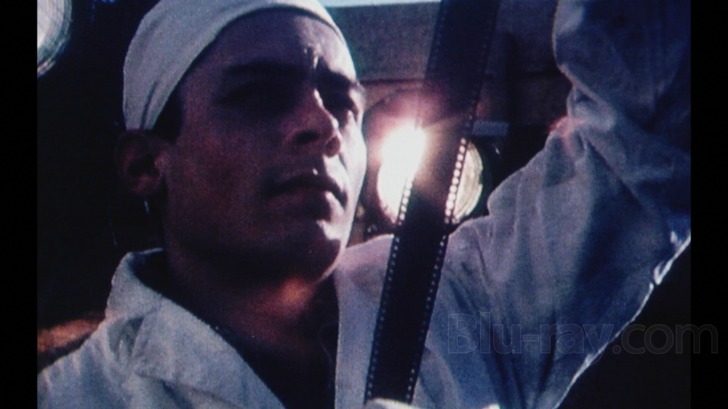
Set aside, for a moment, any conceptions you may have about "picture quality," as The Last of England was never meant to look conventionally "good." Shot on Super-8, transferred to VHS for editing, and then printed on 35mm, the film's twice-duped post-production process has left it simultaneously smeary and grainy, with occasional home video quirks like ghosting and color bleed. The texture of the picture is unlike anything else I've ever seen and defies critique based on the usual PQ considerations of clarity and color. As expected from Super-8, the footage is decidedly soft, and the transfer to VHS results in an additional loss of sharpness, giving the image a surreal quality, several times removed from reality. Some sections are presented in straight black and white, others tinted a rusty red, and a few in relatively untouched color. There are some specks and scratches on the print, but these are barely noticeably in the surrounding visual barrage. Kino's 1080p/AVC-encoded presentation seems entirely faithful to source—no obvious compression problems or other Blu-ray production issues—and that's really all there is to say here as far as a review goes. High marks for accuracy.
The Last of England Blu-ray Movie, Audio Quality 
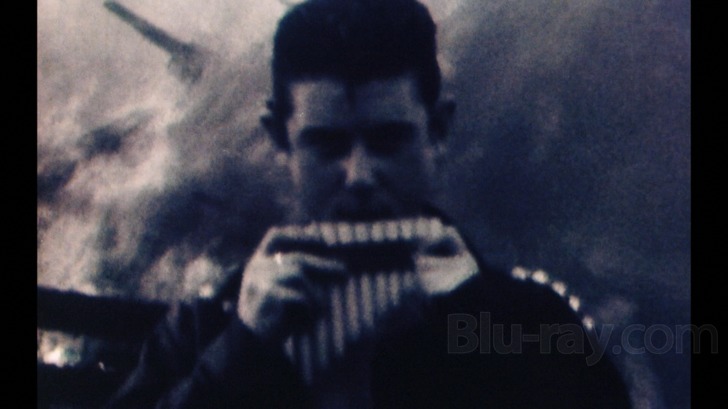
Kino has reproduced the film's sound mix via a lossless DTS-HD Master Audio 2.0 stereo track that—like The Last of England as a whole—assaults and grates and worms its way into your brain. In short, it's effective. The narration is booming, the minimal dialogue is easily understood, and there are no major audio issues to report beyond a mild hissing that occasionally cuts through the chaos. What sound effects we hear were clearly recorded by a foley artist—not on location—and they sound noticeably dubbed-in. This, however, is all part of the grimy no-budget charm. Simon Fisher-Turner turns in an original score that's often jarring but sometimes surprisingly poignant, and the music all sounds fine, if a bit brash in the high end. There's some low-end output that I didn't expect—like the rumble of an approaching aircraft—and an appreciable sense of stereo separation. There was one moment where a particularly immersive phaser effect even made me wonder if I was listening to 5.1 mix. The only real shortcoming here is that the disc doesn't include any subtitle options for those who might need or want them.
The Last of England Blu-ray Movie, Special Features and Extras 
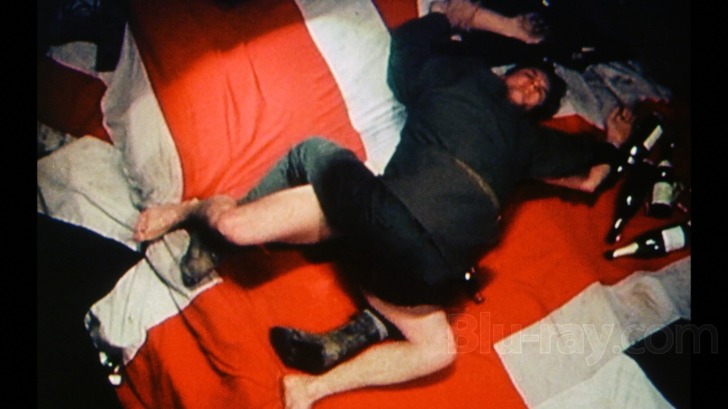
There's not a single supplement on the disc. The top menu includes only tabs for "Play" and "Chapters."
The Last of England Blu-ray Movie, Overall Score and Recommendation 
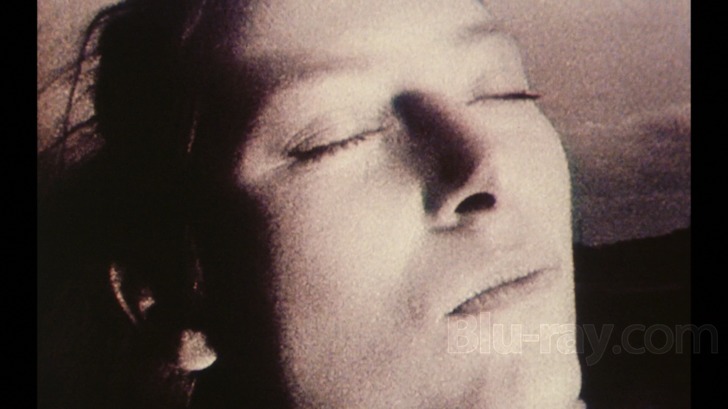
Post-Trainspotting, the idea of heroin junkies living in filth and doping up with dirty needles has become something of a cliche. There's also the fact that Derek Jarman's bleak vision of the future ultimately never came to pass, both of which retroactively dull The Last of England's impact somewhat. Still, as a piece of personal, experimental cinema—using Eisenstein-like point/counterpoint montage to horrify and satirize—the film is still capable of mesmerizing its admittedly niche audience. "Not everyone's cup of tea" might as well be the film's tagline, as only committed fans of avant-garde, non-narrative filmmaking will want to check this one out. It's a bummer there are no extras on the disc, but Kino's Blu-ray transfer at least seems faithful to its intentionally gritty, smeary, conventionally ugly source. Recommended for the same sort of folks who might enjoy a looser, more punk take on Kenneth Anger or Maya Deren.
Similar titles
Similar titles you might also like
(Still not reliable for this title)

Tom of Finland
2017

Aquarius
2016

A Master Builder
2013

My Beautiful Laundrette
1985

Querelle
1982

Loveless
Нелюбовь / Nelyubov
2017

Working Girls
1986

The Club
El Club
2015

Merry Christmas Mr. Lawrence
1983

Call Me by Your Name
2017

Bob & Carol & Ted & Alice
Limited Edition to 3000
1969

Mustang
2015

Laurence Anyways
2012

Pioneer
Pionér
2013

Beanpole
Дылда / Dylda
2019

Poison
1991

Melancholia
2011

Speaking Parts
Slipcover in Original Pressing
1989

Reflections in a Golden Eye
Warner Archive Collection
1967

Mammoth
2009